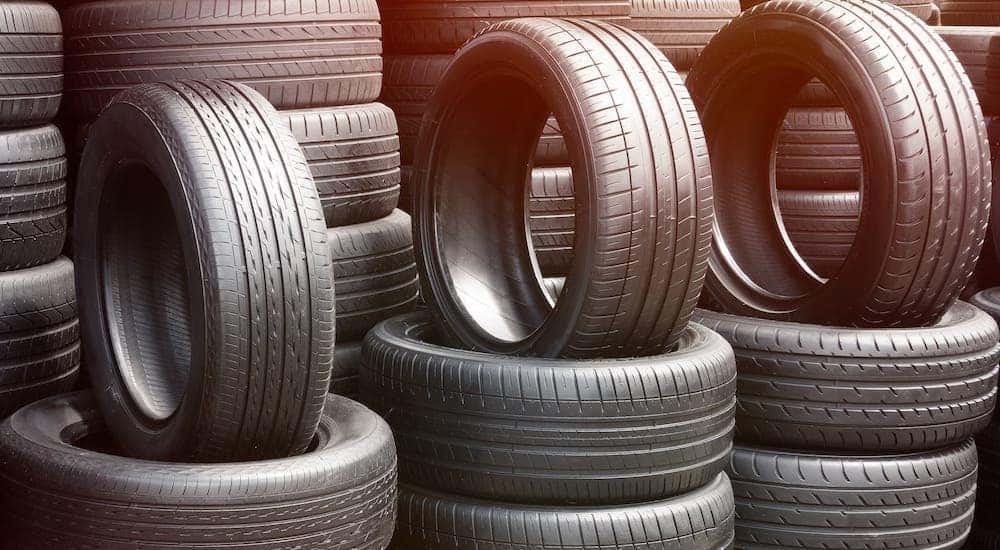Tire Solution: Recognizing Tire Stress Surveillance Solutions
Comprehending Tire Stress Monitoring Systems (TPMS) is a crucial facet of keeping ideal vehicle performance and safety on the road. With advancements in automobile innovation, TPMS has come to be a basic feature in modern-day lorries, offering real-time details on tire stress levels. Diving much deeper into the details of TPMS, one can uncover the numerous components that comprise this system and the importance of each in ensuring accurate tracking. From straight to indirect TPMS systems, the landscape of tire pressure tracking varies, each with its unique set of benefits and considerations. Remain tuned to untangle the complexities of TPMS, from maintenance suggestions to the indisputable benefits of keeping your tires properly inflated. tire shop morris.

Significance of TPMS
The relevance of Tire Pressure Surveillance Solutions (TPMS) lies in their capacity to enhance car security and efficiency with real-time tracking of tire stress degrees. Maintaining the right tire stress is critical for making sure optimum handling, braking, and overall safety and security of a car. TPMS offers vehicle drivers with prompt feedback on any kind of underinflated or overinflated tires, enabling timely changes to be made.
Components of TPMS
Making up various important aspects, a Tire Stress Surveillance System (TPMS) operates as an innovative security function in contemporary cars. The primary parts of a TPMS include sensors, a control component, and a warning indicator. Sensing units are typically situated in the tire shutoff stem or connected to the wheel setting up, where they gauge tire pressure and transmit data to the control component. If it detects considerably low pressure in any of the tires, the control module processes this info and sets off a caution. The caution indication, often a sign on the control panel, notifies the vehicle driver to inspect the afflicted tire or tires. Some progressed TPMS models likewise show the actual tire stress readings for each tire, providing drivers with real-time information to ensure optimal tire performance and safety. By keeping track of tire pressure continually, TPMS assists protect against accidents, minimizes tire wear, and boosts gas performance, making it an important element for automobile safety and efficiency.
Sorts Of TPMS

On the other hand, indirect TPMS relies on the automobile's wheel speed sensing units to monitor tire stress. This system spots underinflation by contrasting the rotational speeds of the wheels. Indirect TPMS is less pricey than straight TPMS, as it uses existing sensing units within the lorry.
While direct TPMS uses much more precise analyses, indirect TPMS is less complex in design and typically needs less maintenance. Both systems have their constraints and advantages, and the option between them typically depends you can check here on aspects such as expense, lorry make, and personal choice. Understanding the distinctions between these two kinds of TPMS can help lorry owners make informed decisions concerning tire upkeep and security.
TPMS Upkeep Tips
Conduct routine checks on the tire stress levels and compare them with the TPMS analyses to ensure they are regular. Throughout tire turning or replacement, make certain that the TPMS components are taken care of carefully to avoid any prospective damages. If the TPMS advising light illuminates on the control panel, deal with the concern without delay by inspecting the tire stress and the total system for any kind of faults.
Benefits of Appropriate Tire Pressure
Keeping correct tire pressure, as highlighted in TPMS Maintenance Tips, is vital for enjoying the various benefits connected with optimum tire stress degrees. Among the main benefits of maintaining the right tire pressure is boosted gas efficiency. When tires are appropriately inflated, there is much less moving resistance, leading to better fuel economic situation. Furthermore, appropriate tire pressure makes certain also tire wear, extending the life expectancy of the tires and advertising more secure driving conditions. With the right tire pressure, cars likewise have much better handling and grip, especially in adverse climate condition. This can boost overall driving performance and safety for the motorist and guests. Preserving optimal tire special info stress can contribute to a smoother and much more comfy adventure by reducing resonances and noise created by underinflated tires. In final thought, the advantages of appropriate tire stress surpass just tire durability; they incorporate improved fuel effectiveness, improved safety, much better lorry efficiency, and overall driving convenience.
Conclusion
In verdict, recognizing tire stress surveillance systems (TPMS) is crucial for keeping ideal tire pressure and making sure car safety. By identifying the importance of TPMS, recognizing with its components, understanding the different kinds available, adhering to appropriate maintenance suggestions, and recognizing the advantages of preserving appropriate tire pressure, drivers can boost their driving experience and extend the life expectancy of their tires. Proper tire stress is vital to efficient and risk-free lorry operation.

Comments on “Trust Morris Tire and Alignment for Expert Service and Treatment”